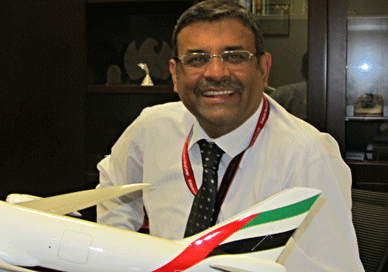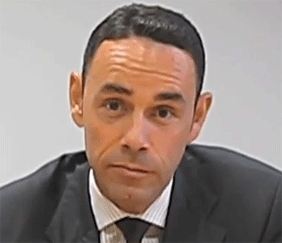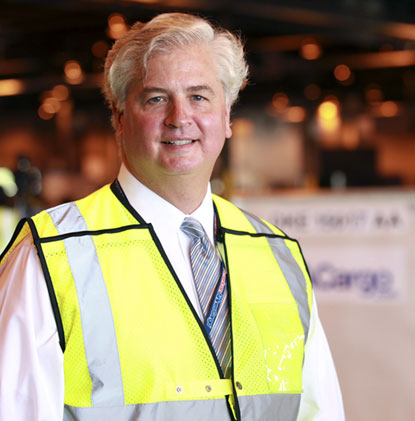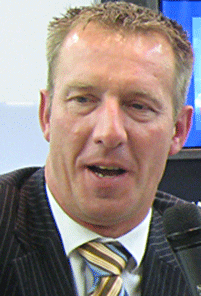

As we come into
2012, here are some takes about the year that was and what will perhaps
transpire in the year ahead.
 Marco
Sorgetti Marco
Sorgetti
Director General
FIATA
What surprised me most when I assumed
my post at FIATA was the kindness of the people I met, both in the
office and outside. All are going out of their way to be helpful.
This is a very comforting feeling.
The 1st of January is a good date for
wishes… my top priority is certainly to understand the best
way for me to contribute to FIATA’s success. One of the issues
on the table is the digitalization of the FIATA documents: quite a
staggering task, in my view. I also believe the cooperation between
airlines and forwarders on the one side, as well as forwarders and
shippers on the other, needs to be strengthened in light of a relationship
which reflects modern business paradigms.
Split, that is what I would call the
business climate in 2012. There are areas where business is thriving
or at least it is decent and other areas in the world that are struggling
with recession. The economy still looks like a rollercoaster ride
and this makes everything complicated. However, freight forwarders
are well placed to deal with complexity. Our industry is flexible
and innovative, and I suspect we shall emerge stronger from these
difficult times.
I think we should be all looking straight
ahead and be ready to support one another. Air cargo is a collaborative
industry by definition and peer cooperation is essential for the industry
to thrive. Sometimes we make the mistake thinking that others have
less potential or credentials, and this is just making the collaboration
more difficult when it could be more satisfactory for everybody. My
impression is that freight forwarders are willing to do their bit
and are prepared to cooperate.
When I started in 1972, I was asked
to deal with a 20-ton load of pins “in bulk.” A joker
of a colleague asked me: how do you load that? I replied: by using
an electro-magnetic crane. Then everybody laughed with me, instead
of at me. Transport is passion and fun: you get angry at your customers
when they make their “Euro” pallets 83x122, but you get
happy when you load 200 percent of the container payload. Despite
the snags, the delays, the complications and the unfortunate lack
of appreciation for the value of logistics, we all know that the world
would be drab and poor without our work. Food would be hard to come
by, apparel and shoes would be too expensive for many, no easy access
to games, entertainment and other amenities. In my view those who
work in transport and logistics should think of themselves as the
unsung heroes of our times. When I was
born the vast majority of humanity was affected by hunger and poverty.
Nowadays, still too many are hungry and poor, but their proportion
is smaller than sixty years ago. In part, this change was made possible
by the evolution of logistics, which made international trade accessible
to all peoples in the world. We are the smooth operators of the world;
sometimes our work is so smooth that it goes unnoticed.
 Ram
Menen Ram
Menen
Divisional Senior Vice President Cargo
Emirates Airlines
The year 2011 has been another one of
those challenging years, full of natural disasters affecting/disrupting
supply chain operations, and with the sustained high fuel prices and
political interventions on economic activities, the markets slowed
down to a crawl.
To be honest, nobody anticipated this
to happen—the industry getting into crisis mode again so quickly
after the economic meltdown of 2008/09!
For us, the year has been flat.
We are likely to continue to deal with
the current challenges into 2012.
This whole period is going to be a new
learning curve for all (economists included). The learning of the
past is probably going to be consigned to history and the learning
of today is what is going to shape tomorrow. Old rules don’t
apply and the new rules are not written.
Forecasting anything has been, and will
be, a challenge; hence, it is back to managing the moment! 2012 is
likely to be a slow growth—I expect it to be slightly better
than this year.
A lot is dependent on which way the
oil prices go.
If the U.S. dollar gains further sustained
strength on current levels, we can expect a positive impact on world
trade and thereby on air cargo.
 Michael
G. Vorwerk Michael
G. Vorwerk
President
Cargo Network Services Corp.
Strong start of the year and still ending
with some 6 percent growth in volumes for CNS.
Very successful CNS conference 2011
and good signs for strong participation in 2012 in Miami. Good progress
with the help of many industry stakeholders on further automation
efforts (e-freight, e-AWB), expecting 9 percent e-freight penetration
by yearend, aggressive goals for 2012.
Target for e-AWB is 15 percent in 2012.
2011 was clearly the year for quality
initiatives, for CASS > 99 percent and Cargo 2000 on data congruence
among members > 98 percent, to be continued in 2012.
Security is very high on everyone's
agenda, with some good progress in 2011 and more to be seen and tackled
in 2012 with a drive for harmonization.
Highly challenging economic outlook
for air cargo industry, especially in Europe and Asia.
I hope that the recovery in 2012 will
come as fast as the recent downturn developed.
 Andreas
Otto Andreas
Otto
Executive Board Member Product & Sales
Lufthansa Cargo
After a very challenging but successful
2011, we are also quietly optimistic for the upcoming year. For sure,
the entire industry will have to deal with reduced growth, especially
in the first half of the year.
However, we are far away from a real
crisis and do expect good development in the second-half of 2012.
In my opinion, the perceived weakness of the global economy is worse
than the actual situation which is also due to a lot of negative reports
in media. Rather than complaining, we are focusing on our strengths,
investing into new products as well as our network to benefit our
customers and by doing so, expect to further develop our position
as an industry leader.
At the same time, we are prepared to
react quickly if required by market developments.In 2012, all eyes
at Lufthansa Cargo will be on The Federal Administrative Court of
Germany in Leipzig, which will decide on the night flight ban at our
hub in Frankfurt in March. The court ruling will have tremendous effect
on the further development of the largest airport in Germany and the
future growth of the locally based airlines, forwarders and other
companies.
The last words here are directed to
our customers that gave us their support in 2011, as well as to all
our colleagues from our company who made the big success possible.
Thanks to you and a Happy New Year.
 Stan
Wraight Stan
Wraight
Managing Partner
Strategic Aviation Solutions Int'l
2011 was not a year to forget, and hopefully
one where lessons were learned. Again, a down cycle caught everyone
by surprise and that for me was the big surprise; history always repeats
itself. The lessons of the past years were not heeded, or everyone
felt they were smarter than the guy down the block.
The massive capacity increases in passenger
bellies puts the whole stand alone, pure freighter airline business
case in jeopardy; has it reached the end of its life cycle as some
think, or will it resurrect itself?
The savvy passenger airlines will continue
to look for synergies between pure freighters and their passenger
belly uplift, and, through smart revenue management tools where the
total line exploitation model shows the true value of a small freighter
fleet, reap the benefits. Those who don’t understand cargo will
not, and they will be the worse for that decision.
Meanwhile at SASI, we have had a great
year where our niche of being advisors to the aviation industry, with
offers of experienced, practical, neutral and effective advice, has
been very well received by our global clients, and we continue to
grow. We have been very active in advising airports in particular,
however financial institutions, manufacturers, and airlines form a
large part of our client base. They are looking for solid advice of
what we see for the future and how to prepare for a profitable and
growth-oriented business case.
As far as what we see for 2012, this
will bring more of the same as the world economy changes and struggles
to cope with an ultimate consumer continuing to worry about his or
her job and spending power. As a consequence, we believe further consolidation
and retrenchment will come in the airline business as costs remain
high and revenues fall, particularly in Europe and parts of Asia.
It’s a commodity business now for the legacy airlines in particular,
and they know it. Hopefully the witch-hunt against our best talent
will stop, and stability and sanity will return.
The biggest challenge for airlines,
airports, government authorities, regulators and the whole logistics
industry in general will be finding and keeping new talent while simultaneously
developing the next generation of leaders to cope with this new reality.
Let’s be honest, our industry does not have the appeal it once
had and if it’s to remain viable and a source of badly needed
revenue and a true core business, we have to change.
We have to make it an industry where
people will be proud again to be part of it, and see a future ahead
that can be stable and productive.
That is the challenge, and we have an
obligation to make it happen.
 |
 |
 W.
Garner McNett W.
Garner McNett
President
Cargo Data Management Corporation
In this year (2011) of economic torment
for so many, we have been very fortunate and have enjoyed an excellent
year.
Our numbers will be better than anything
we have experienced for several years, highlighted by three system
installations in less than a year.
For a small company like ours, this
is quite amazing.
For 2012 we already have more opportunities
than we normally see in a two or three year span.
Not only is this an expansion of the
core business, but we are now looking at writing systems further up
the supply chain and working to connect all the players in the process.
These are very exciting days.
We have several new carriers showing
interest in new cargo systems, which means they think they can make
money with a startup now.
This is a good sign for the industry
when people are optimistic about air cargo right now and are willing
to invest money today and not down the road.
All the signs we see point to a strong
2012.
I am still in awe of the rapid change
in technology within the air cargo industry. We installed our first
hosted e-awb system in the fall of 2003 and now we are talking about
tracking freight on our smart phones. As we look about us, we can
still see companies that operate with minimum technology while others
are breaking new technological ground every day.
But what is clear to me is that we are
all getting smarter pretty fast.
From new cargo marketing approaches
to better cooperation within the supply chain to carriers using WAAS
approaches into airports, everyone is using technology to try to improve
the quality of the overall product.
As an industry we have to be smart and
make sure we get the singles because the home runs will take care
of themselves. Profit is the great motivator but greed will always
get us into trouble.
As we bring 2011 to an end I would like
to thank you and FlyingTypers for the great job that you do.
You provide an enormous service to this
industry because of your honest, timely articles and commentary.
No subject is too delicate or sensitive.
Most of all, you address the people
component of the industry, which is the very essence of who we are
and what we do. Without the people, it is just numbers and hardware.
 Michael
Steen Michael
Steen
Executive Vice President and Chief Commercial Officer
Atlas Air Worldwide Holdings, Inc.
Chairman TIACA
2011 was a very difficult year for the
air cargo industry, with affected macro-economic challenges such as
the Euro Zone debt crisis, which dampened consumer confidence, and
environmental disasters in Japan and Thailand, which disrupted global
supply chains and manufacturing output by delaying the introduction
of new technology products in particular.
The industry in general recognized the
need for closer collaboration between the various industry segments,
which resulted in the creation of the Global Air Cargo Advisory Group,
the first ever industry-encompassing coalition.
GACAG and TIACA had an excellent year
with great accomplishments in all of its Committee efforts, particularly
in regard to the increased dialogue and collaboration with U.S. and
EU policy makers, ICAO, WTO and the WCO.
In 2012 we can expect to see a sustained
“flat” airfreight demand in the first half of the year
driven by the continued economic uncertainties in the Euro Zone
I expect, however, that we will see
a gradual increase in global airfreight demand as of the second half
of 2012 as consumer confidence improves, inventories in all industries
need to be replenished and new product releases reach the market.
The industry must continue its focus
on a very close collaboration across the industry segments. There
are many critical policy discussions and decisions regarding air cargo
security, environmental regulations and potential taxes which need
to be closely aligned with the industry to ensure that it does not
harm global trade, but still meets the set objectives.
Industry leaders must therefore take
initiative and responsibility by joining and supporting the efforts
of TIACA and GACAG and thereby ensure that we build an even stronger
and more resilient air cargo industry.
 Reto
Hunziker Reto
Hunziker
Managing Director
Lufthansa Cargo Charter
2011 for LCCA was not the easiest one.
We have seen some serious problems and issues far before other members
of the industry announced the same.
The main driver of the results was the
development in Asia, where we did relatively low business compared
to the years before. However, all the other regions did not perform
as expected either.
At the same time we continued to implement
our new strategy by approaching different markets and segments through
our own setup or a 3rd party cooperation.
Lufthansa Charter also pushed our geographical
expansion forward by opening sales representatives in MIA, DEL and
SHA.
We don't see that it becoming easier
in 2012.
However, due to internal and external
measures taken, we are confident that we are very well prepared for
whatever is to come.
It will take a while until the markets
are back to normal and a lot is dependent on political changes and
the economic development in Europe as well as in the U.S.
We are prepared to overcome the slowdown
and ready and well prepared once the economy gets better again. There
is definitely more to come from LCCA in 2012!
 Dave
Brooks Dave
Brooks
President
American Airlines Cargo
For the industry, 2011: strong start,
weak finish.
For 2012: the opposite—soft front-end,
but come midyear I expect favorable trends based on Eurozone corrections,
improving employment in the U.S., and stable (but high) fuel.
For AA and AA Cargo, all I can say is
that the support and encouragement we have gotten from our customers
as we embark on rebuilding our company has been enormously humbling
and gratifying – thank you all!
 Peter
Scholten Peter
Scholten
Vice President Cargo
Saudi Arabian Cargo Company
The year 2011 was tough with overcapacity,
declining cargo volumes since July and pressure on rates in the major
market.
The bright spots in 2011 were the emerging
markets in Africa, India and South America.
Most industry forecasts for 2012 are
pessimistic, particularly for the exports to Europe and USA. No doubt,
2012 will be another tough year with overcapacity, stagnating cargo
volumes and further pressure on rates in the major markets.
Contrary to the global market developments,
at Saudi Airlines Cargo we saw an average growth of 30 percent in
our scheduled cargo services since June 2011, when we added 2 freighters
to our network. Our charter business grew explosively by 75 percent
this year, which confirms our definite return in this market segment.
At the end of 2011 we achieved a major milestone with the implementation
of Cargospot.
Our focus for 2012 will be on improving
the utilization on our massive belly network. We will introduce 'BellyFlex',
a low-end belly product with longer transit times at our hubs for
attractive rates. New freighter services in 2012 are planned for Frankfurt,
Vienna, Ho Chi Min and Accra. With our flexible freighter fleet we
foresee further growth in the charter market.
We are ready for another tough year
and are confident that we will continue to improve our service levels
as we grow our network.
 Joachim
H. Frigger Joachim
H. Frigger
CEO
EMO Trans
Uncertainty has to be the key word for
global business during the last 6 months and uncertainty stays moving
forward into 2012. Load factors are not as strong, Freight rates are
inching down, space is more easily available. Airlines, steamship
companies, truckers alike are again all concerned about their load
factors and profitability. Yet, in general, business remains fairly
steady and shippers and importers alike stay cautiously optimistic
and so should the freight forwarders.
All told, 2011 showed increased profits
over 2010 and I believe that 2012 may well give us increased results
over 2011. The concerns are largely the same as in previous years.
Regulatory restrictions, currency exchange
rates, concerns about the U.S. economy and consumer buying power,
European discord over their common market strategies and the Euro.
The roller coaster of the stock market does not help, but Asia and
Latin America seem to be stable, as is Australasia.
For us, the way out of a weakening
economy is to follow a determined policy of continued investment in
network development, strong sales and streamlining operations for
total customer satisfaction. All this has to go alongside with financial
stability and a positive cash flow. Anyone who is not dependent on
bank loans will remain in a strong position.
If we are indeed heading into another
recession, and I don’t think it is going to happen, the measures
taken in 2009 by sensible companies to survive and forge ahead will
work very well again.

|




 W.
Garner McNett
W.
Garner McNett Michael
Steen
Michael
Steen Reto
Hunziker
Reto
Hunziker Dave
Brooks
Dave
Brooks Peter
Scholten
Peter
Scholten Joachim
H. Frigger
Joachim
H. Frigger